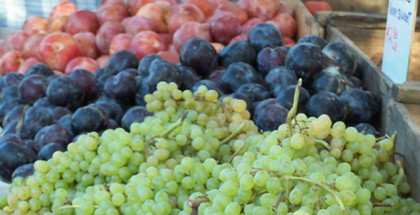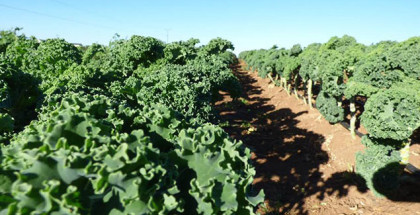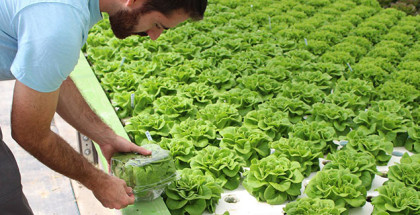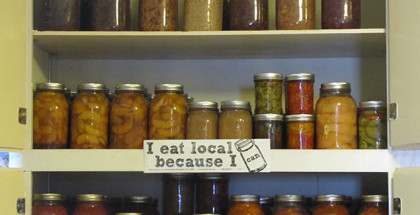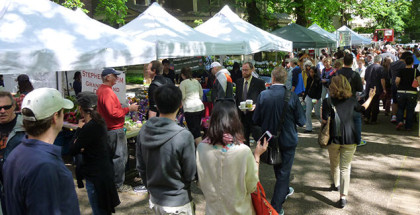Uncategorized
Sparks, Nevada Passes New Urban Agriculture Ordinance
January 13, 2016 | Davina van BurenResidents of Sparks, Nevada now have a lot more options when it comes to farming inside city limits.
In October, city council members voted unanimously to approve a new urban agriculture ordinance that allows for community gardens to be built on vacant or blighted plots in the city. Citizens will also be allowed to raise chickens and bees on private properties.
According to City Manager Steve Driscoll, the revamp of the city’s zoning codes had been in the works for quite some time. As a result of the housing recession, the city council wanted to take a fresh look at what would make the smartest uses of available land and zoning designations.
“In the late 1990s, we were building 300-400 new houses a year in Sparks,” says Driscoll. “From 2003–2005, we were building 2,500 houses a year. In 2008, we built zero. We looked at all our building processes and asked, ‘What lessons did we learn? If we ever ramp up and do that number of houses again, what would we do differently?’” Read More
Financial Future Bright for Food Hubs, Study Says
January 12, 2016 | AJ Hughes
This map shows the number of farms with direct sales to restaurants and/or retail establishments as of 2012, and the locations of food hubs as of 2014. (image courtesy of Gary Matteson/Farm Credit Council)
Food hubs are viable businesses with bright futures, according to a recent financial study on food hubs.
The COUNTING VALUES: Food Hub Financial Benchmarking Study drew on financial and operational data from 48 of the more than 300 food hubs in the United States. The report aims to compare results within particular sectors to develop baseline performance statistics.
It’s also the first report of its kind to focus on food hub performance metrics. The report formally defines a regional food hub as “a business or organization that actively manages the aggregation, distribution, and marketing of source-identified products primarily from local and regional producers for the purpose of strengthening producer capacity and their access to wholesale, retail, and institutional markets.” Read More
Temecula Valley Emerging as Epicenter of Local Food and Agriculture in Riverside County
January 11, 2016 | AJ HughesGrass-fed beef, yams, ostrich eggs, duck eggs, quail eggs, wild game—all of these and more can be found in or near Temecula, California.
Located in southwestern Riverside County and at the southwest point of the Inland Empire region, Temecula is located in the Temecula Valley, home to many vineyards and wineries.
While Temecula is now a thriving epicenter of the local foods movement, this was not always the case.
When local food artisan and chef Leah Di Bernardo decided to move back to Southern California from New York City (she grew up on both coasts), Riverside County was the last place she thought she would end up. But she landed in Temecula. Read More
Vista, California-based Solutions Farms Combats Family Homelessness with Aquaponics Training
January 10, 2016 | Trish PopovitchIn addressing homelessness with an aquaponics training program, Solutions Farms provides an opportunity for families to regain not only their financial footing and place in the community, but also their security and happiness. Solution Farms is a program that was created by Solutions for Change, a Vista, California-based nonprofit established in 1999 to address local family homelessness in innovative ways.
Kevin Gorham is the aquaponics specialist at Solution Farms. He came to the initiative with little experience, but plenty of enthusiasm.
“I heard about this place being built, so I drove over here and introduced myself. I just kept bothering them and telling them I’d like a job here. Once the system was up and going, they hired me to stay on and help manage and run it,” says Gorham. “I learned a lot more through my hands-on experience working here over the last three years.” Read More
Six Powerhouse Food Policy Councils Driving Local Food in Cities
January 8, 2016 | Morgan Bulger
A farmers’ market in a suburb of Cleveland proudly accepting the EBT card, due to the work of the Cleveland-Cuyahoga County Food Policy Coalition
Photo Credit: Cleveland-Cuyahoga County Food Policy Coalition
There are now food policy councils in every state across the U.S., tasked with bringing diverse stakeholders together towards the creation of policies and laws that help develop the economic, environmental, and social infrastructure that makes up a local food system.
Below are six food policy councils that have put in the work towards urban agriculture zoning, food access, and institutional purchasing, and have achieved results.
1. Cleveland, Ohio: Cuyahoga County Food Policy Coalition
The Cleveland-Cuyahoga County Food Policy Coalition, founded in 2007, has been instrumental in establishing the food legislation landscape in Cleveland as well as facilitating and managing a variety of programs to improve food access for area residents and assist institutions with their local food procurement. Read More
Pioneering SoCal Business Finds Profit in Development of Urban Edible Landscapes
January 7, 2016 | Trish PopovitchEstablished in 2008, Urban Plantations was one of the nation’s first edible landscaping companies. Offering year-round organic gardening and landscaping services to corporate, residential and assisted-living clients, this small company of 11 continues to grow while providing jobs and quality organic food to residents in the San Diego area.
“We were one of the first of our kind. When we started the business, there was no model for us to pull from. We were, I feel, like true entrepreneurs. We weren’t starting a dry cleaning business or something like that. We had to figure out how to market a business that didn’t really exist,” says Karen Contreras, founder, president and CEO of the company. Read More
18 Ways to Eat Sustainably in 2016
December 31, 2015 | Davina van Buren
Windowsill herb garden. Credit: Davina Inman
Getting ready to put together those New Years’ resolutions? If eating more sustainably is among them, here’s a quick guide to get you started.
1. Can, freeze and dehydrate all year.
Put up foods like berries and summery fruits and veggies throughout the year instead of buying them out of season. This way you can still cook with local foods even in the dead of winter. Save money by patronizing you-pick farms for berries and vegetables in the summer; apples, pears and pumpkins in the fall. Read More
Can Small Farmers Make a Profit at Farmers Markets?
December 30, 2015 | AJ HughesThe last decade has seen nothing short of a bonanza in farmers’ markets in America. Between 2007-2014, the number of farmers’ markets in the U.S. has grown by nearly 180 percent, according to a January 2015 USDA report. That’s accompanied by a 288 percent growth in regional food hubs and 430 percent in farm-to-school programs.
But the data also show that while food hub sales continue to climb, sales at farmers’ markets may have peaked.
So can farmers, especially ones who operate on a small scale, make enough money at farmers’ markets to make it worth their while? Or is the proliferation of farmers’ market we’ve seen over the last decade coming to an end? Read More

